Key players in the Trump impeachment probe and what they testified to Congress
Over a dozen officials have come forward so far.
Since House Speaker Nancy Pelosi announced a formal impeachment inquiry in September, there has been a steady drumbeat of current and former administration and government officials who have come forward, either willingly or under subpoena, to testify in the rapidly developing probe.
At the heart of the inquiry is President Donald Trump’s July 25 phone call with Ukraine President Volodymyr Zelenskiy and whether the administration withheld nearly $400 million in aid and a White House summit between the two leaders in exchange for an investigation into the president’s political rival, former Vice President Joe Biden and his son, Hunter for his work on the board of Ukrainian energy company Burisma.
Trump also allegedly wanted the aid withheld unless there was an investigation into a largely debunked theory that it was Ukrainians, not Russians, who tried to interfere in the 2016 election – on behalf of Hillary Clinton – and the Democrats' purported efforts on that front.
A number of questions surround the call, including Trump’s personal lawyer Rudy Giuliani’s alleged role in lobbying the Ukrainian government through back channels, the involvement of Secretary of State Mike Pompeo and Energy Secretary Rick Perry, and why exactly U.S. Ambassador to Ukraine Marie Yovanovitch was recalled.
Democrats say the testimony, both from open proceedings and closed-door depositions, paints a picture of the president’s abuse of power to pursue politically motivated investigations. Republicans have raced to Trump’s defense, saying there was no evidence of a quid pro quo and that the witnesses did not have direct knowledge of Trump’s actions.
The House Judiciary Committee is set to hear this week from constitutional scholars and legal experts as it prepares to potentially draft articles of impeachment.
Here are the people who have testified so far and what they said:
Oct. 3 (closed-door) and Nov. 19 (public), 2019: Kurt Volker, former U.S. special envoy to Ukraine
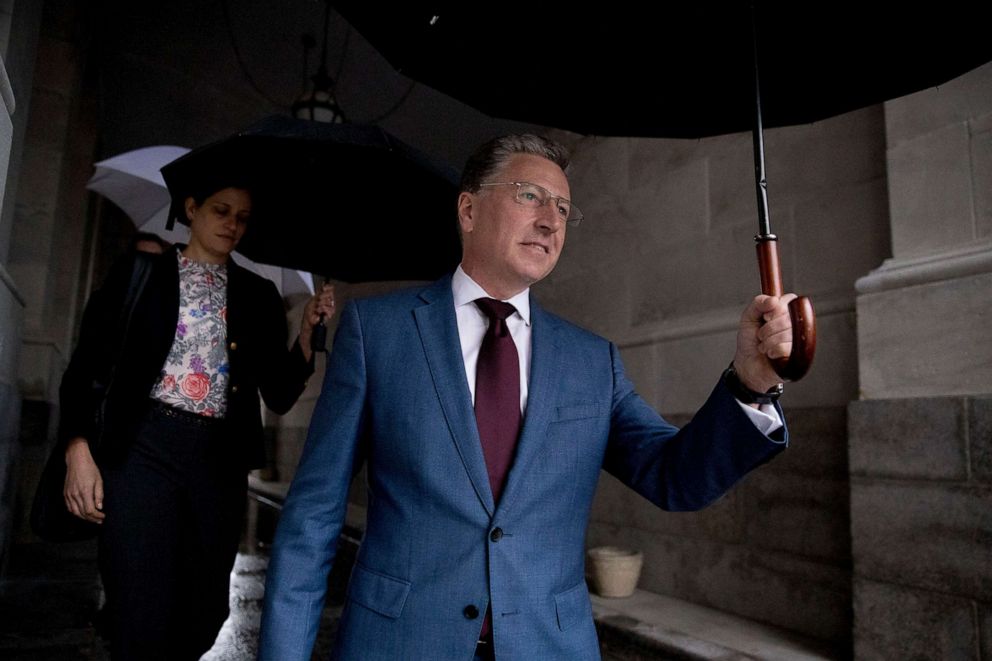
- Began his career in public service as a Central Intelligence Agency analyst in the late 1980s. Joined the State Department's Foreign Service several years later. Made stops at the National Security Council under the Bush Administration and the private sector before then-Secretary Rex Tillerson appointed him as Ukraine envoy.
- News of his resignation was reported less than a week before his testimony.
- Disclosed text messages between him and other high-level U.S. diplomats.
- One of those messages, sent by Bill Taylor on Sept. 9, the top U.S. diplomat in Ukraine, said, “I think it’s crazy to withhold security assistance for help with a political campaign.”
- U.S. Ambassador to the European Union Gordon Sondland replied, “Bill, I believe you are incorrect about President Trump’s intentions. The President has been crystal clear: no quid pro quo’s of any kind.” Sondland later conceded that there was a quid pro quo.
- During his public hearing, Volker discredited what he called "conspiracy theories" that former Vice President Joe Biden was corrupt, testifying that the idea was being pushed by a "self-serving" Ukrainian politician and "are not things that we should be pursing as part of our national security strategy."
- He said he should have picked up sooner on the idea that calling for an investigation into Burisma, the Ukraine gas company, meant investigating false allegations into Biden: "In retrospect, I should have seen that connection differently, and had I done so, I would have raised my own objections."
- Read the transcript.
Oct. 4, 2019: Michael Atkinson, intelligence community inspector general
- Before entering his current role, Atkinson spent 15 years at the Department of Justice, primarily dealing with fraud and corruption. He was a white collar defense attorney before that.
- Atkinson testified behind closed doors before the House Intelligence Committee, providing investigators information obtained in his efforts to corroborate the whistleblower complaint that sparked an impeachment investigation into President Trump.
- He said on Sept. 30 that the complaint “appeared credible” and was “of urgent concern.”
Oct. 11 (closed-door) and Nov. 15 (public), 2019: Marie Yovanovitch, former U.S. Ambassador to Ukraine
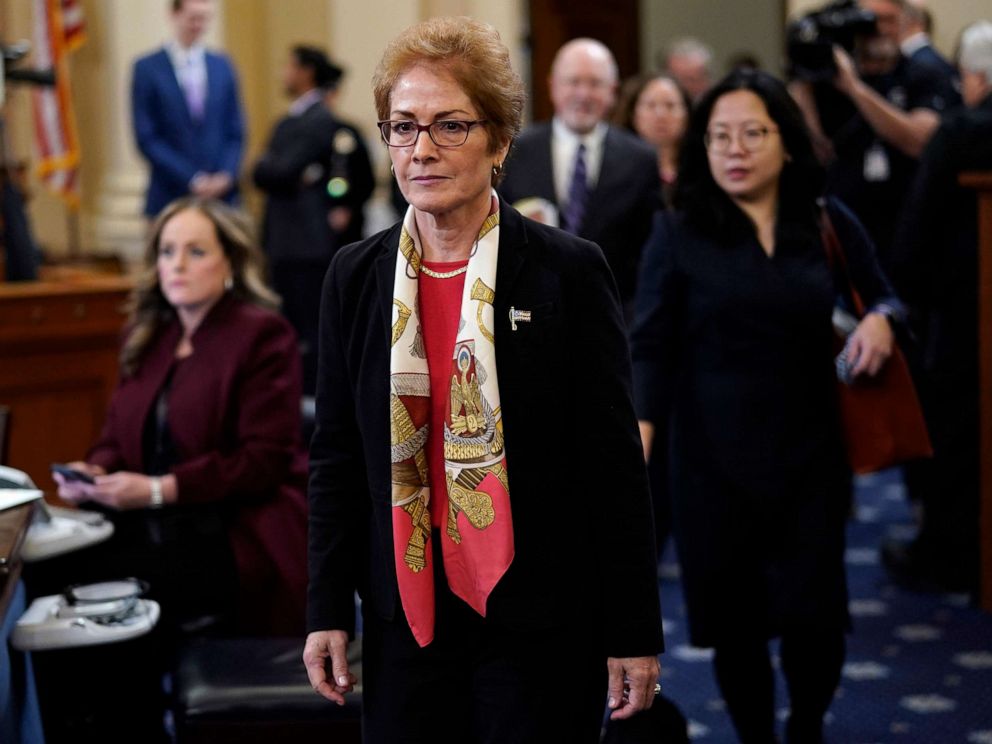
- Joined the Foreign Service in 1986 and remained at the State Department until her ousting in 2019.
- In a prepared statement, Yovanovitch testified she was told that President Donald Trump directly pressured the State Department to remove her from her post, despite being informed of no wrongdoing on her part.
- According to a transcript from her deposition, she said she felt threatened when she learned that Trump said in a phone call with Ukraine President Volodymyr Zelenskiy that she was “going to go through some things.”
- In her public hearing, Yovanovitch disputed conspiracy theories about a coordinated Ukrainian effort to undermine Trump in the 2016 election, describing criticism of Trump by some prominent Ukrainian politicians as “isolated incidents” and pointing to the possibility that Russian President Vladimir Putin could have been trying to create an “alternate narrative” to obscure the Kremlin’s election interference efforts.
- She said Hunter Biden’s work with a Ukraine gas company does represent the appearance of a conflict of interest, but didn’t warrant a corruption probe.
- An hour into her hearing -- which was broadcast and livestreamed around the globe -- Trump tweeted that “everywhere Marie Yovanovitch went turned bad.” Yovanovitch, responding to Rep. Adam Schiff, said she believed her and her colleagues have made the places she's been "demonstrably better."
- Read the transcript.
- Read her public hearing opening statement.
Oct. 14 (closed-door) and Nov. 21 (public), 2019: Fiona Hill, former Russia expert for the National Security Council
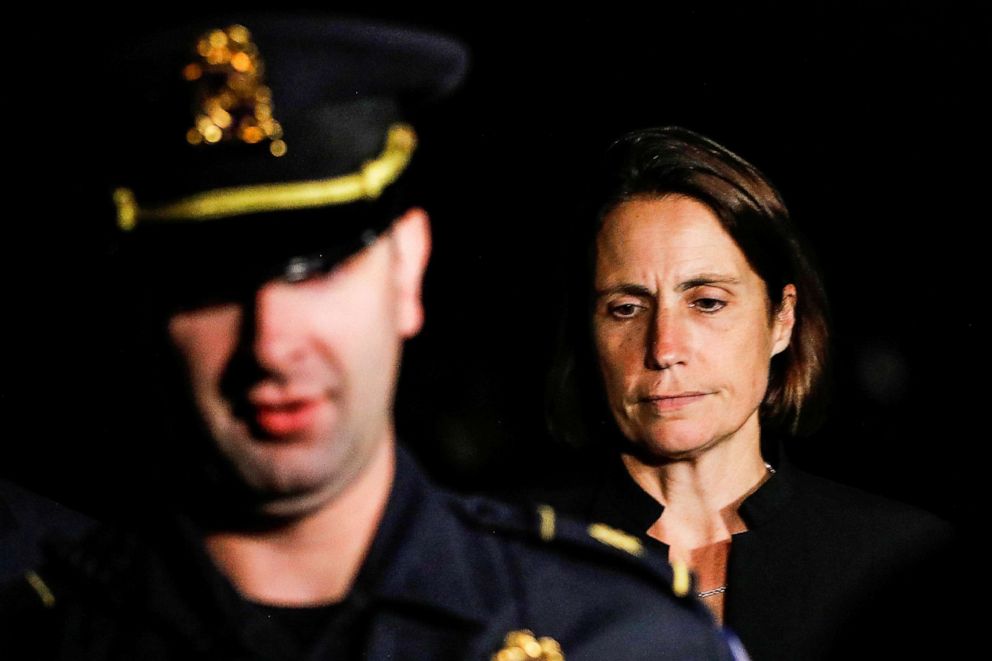
- Before her most recent work in the White House, Hill served under both President George W. Bush and President Barack Obama as a career national intelligence officer for Russia and Eurasia on the National Intelligence Council. She was director of The Brookings Institute’s Center on the United States and Europe from 2009 to 2017.
- Described a July 10 White House meeting with Ukrainian officials in which Gordon Sondland, Trump’s pick for ambassador to the European Union, pressured Ukraine for a political investigation and insisted Acting Chief of Staff Mick Mulvaney had agreed to the plan.
- Following the meeting, Hill said John Bolton, the president’s national security adviser, told her to tell the president’s legal adviser “that I am not part of whatever drug deal Sondland and Mulvaney are cooking up.”
- In her public hearing, Hill said the idea that Ukraine interfered in the 2016 election -- which has been pushed by Trump and some Republicans -- was a “fictional narrative that has been perpetrated and propagated by the Russian security services themselves.”
- She called Sondland’s efforts in Ukraine a “domestic political errand” greenlighted by the president’s top advisers and which “diverged” from official U.S. policy in the region.
- Read the transcript.
Oct. 15 (closed-door) and Nov. 13 (public), 2019: George Kent, Deputy Assistant Secretary of State
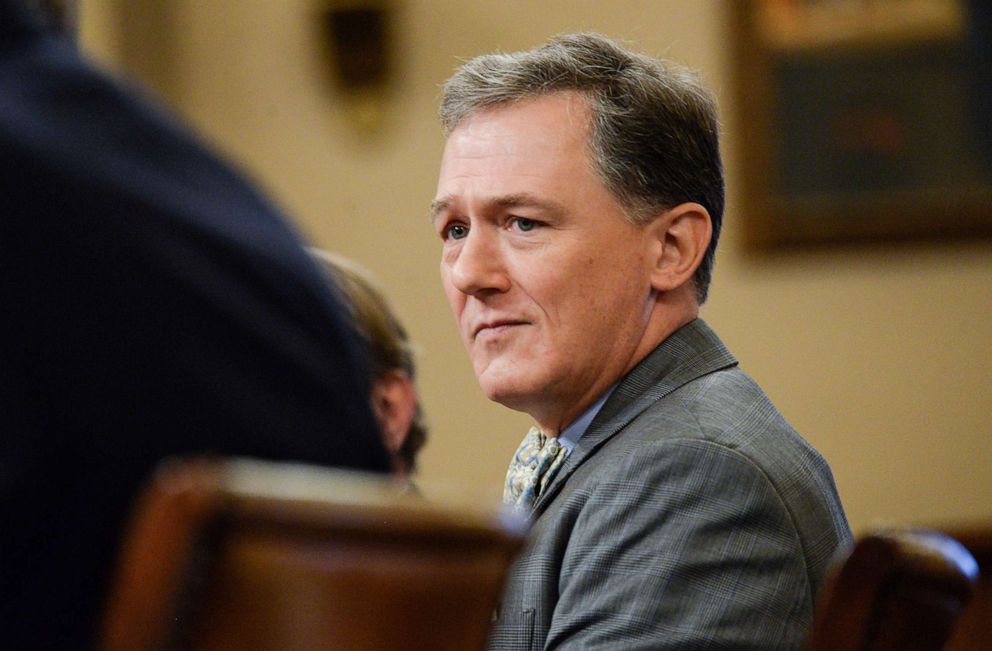
- Kent has previously served as the deputy chief of mission in Kyiv, Ukraine, and the senior anti-corruption coordinator for Europe -- roles that have made him battle-hardened in the fights against corruption and disinformation. A career foreign service officer, he joined the State Department in 1992.
- He said he raised concerns to then-Vice President Joe Biden’s office about a conflict of interest presented by Hunter Biden’s role on the board of Burisma in 2015, but was ultimately rebuffed.
- In a prepared statement, Kent said he “fully” shared Yovanovitch’s “incredulity” over her removal from her post “based, as best she could tell, on unfounded and false claims by people with clearly questionable motives at an especially challenging time in bilateral relations with a newly elected Ukrainian President.”
- Testified that Rudy Giuliani carried out a “campaign of lies” to smear Yovanovitch and that Giuliani pushed Ukraine on Trump’s behalf to investigate Biden based on an unfounded theory about the country’s interference in the 2016 election.
- During his public hearing, Democratic Rep. Jim Himes asked Kent if he witnessed Trump engaging in policy focused on countering corruption in Ukraine, to which Kent responded, “I do not.”
- Read the transcript.
- Read his public hearing opening statement.
Oct. 16, 2019: Michael McKinley, former senior adviser to Secretary of State Mike Pompeo
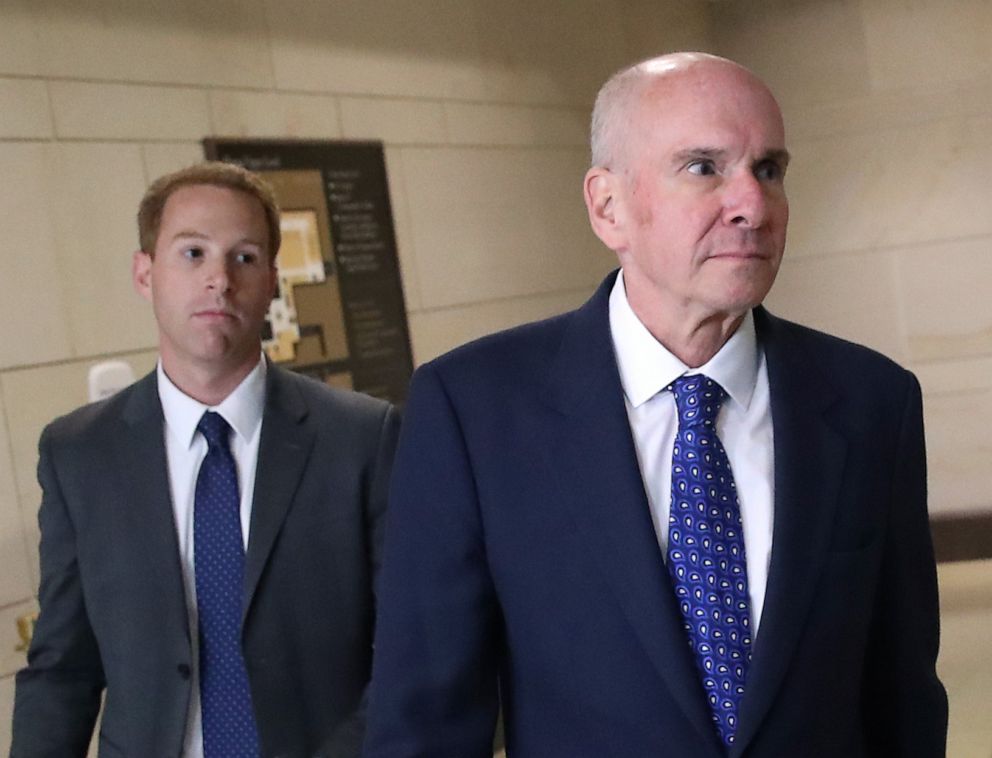
- McKinley, a veteran diplomat who served as U.S. ambassador to Brazil, Afghanistan, Colombia, and Peru, first joined the State Department in 1982.
- In transcripts released by House investigators, McKinley said he was disturbed by a push to use U.S. diplomatic missions "to procure negative political information for domestic purposes," as well as a "failure" at the State Department to support the American diplomatic corps.
- He testified that he asked Pompeo multiple times to show support for Yovanovitch, but Pompeo didn't respond. That directly contradicts what Pompeo told ABC News Chief Anchor George Stephanopoulos on “This Week” in October: "Not -- not -- not once -- not once, George, did Ambassador McKinley say something to me during that entire time period."
- McKinley resigned less than a week before his deposition, in large part, he said because Pompeo didn't do enough to protect Yovanovitch.
- Read the transcript.
Oct. 17 (closed-door) and Nov. 20 (public), 2019: Gordon Sondland, U.S. ambassador to the European Union
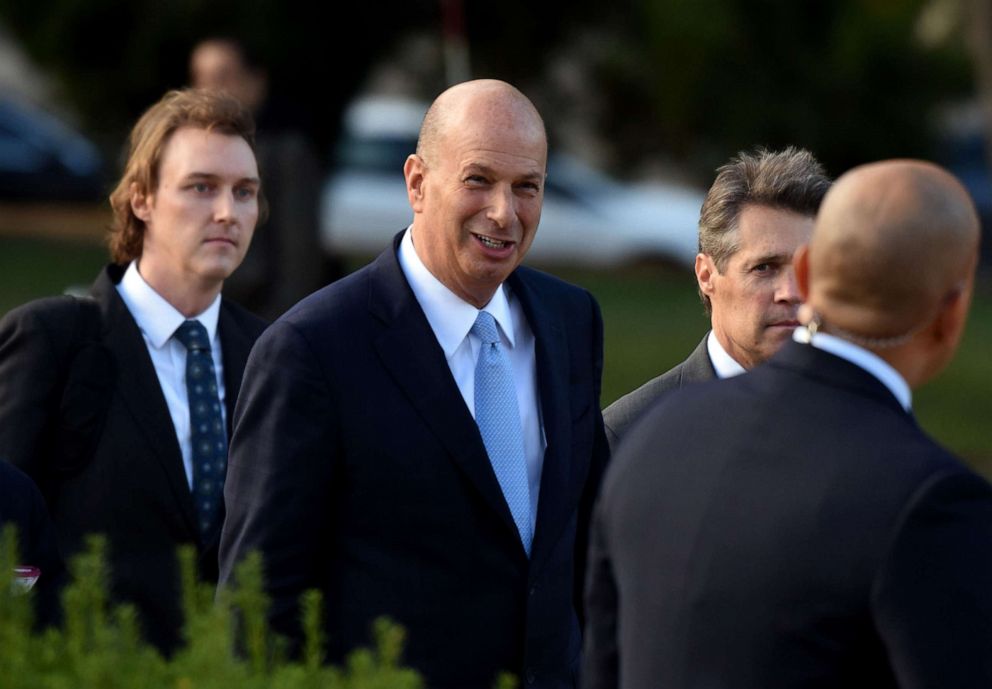
- Sondland, a hotelier from the Pacific Northwest who initially backed Jeb Bush during the 2016 election cycle, wrote checks to the Trump inaugural committee totalling $1 million.
- In his revised testimony, the Trump megadonor-turned-diplomat said that he personally delivered the message on Sept. 1 to a top Ukrainian official that U.S. military aid was contingent upon the country’s ability to launch an investigation that Trump wanted after he “refreshed” his recollection.
- In his original opening statement, he said "inviting a foreign government to undertake investigations for the purpose of influencing an upcoming U.S. election would be wrong. Withholding foreign aid in order to pressure a foreign government to take such steps would be wrong. I did not and would not ever participate in such undertakings."
- He initially told congressional investigators that he, Volker and Energy Secretary Rick Perry disagreed with Trump’s request for them to work with Giuliani, but said he felt he could not ignore a directive from the commander-in-chief.
- Sondland confirmed the existence of a quid pro quo in his public hearing: "I know that members of this committee have frequently framed these complicated issues in the form of a simple question: Was there a 'quid pro quo?' As I testified previously, with regard to the requested White House call and White House meeting, the answer is yes.”
- And by early September, Sondland said he presumed nearly $400 million in U.S. aid to Ukraine was also part of the deal. He said that “everyone was in the loop” about it (Pompeo and Pence never objected when he explicitly mentioned the military aid hold, he said), but no one -- including Trump -- ever outright confirmed it to him.
- He also confirmed most of State Department staffer David Holmes's testimony, who said he overheard a private phone conversation between Trump and Sondland about the investigations: "Sounds like something I would say," Sondland said when asked if he recalled telling President Trump that President Zelenskiy "loves your ass."
- Read the transcript.
- Read his public hearing opening statement.
Oct. 22 (closed-door) and Nov. 13 (public), 2019: Bill Taylor, U.S. charge d’affaires for Ukraine
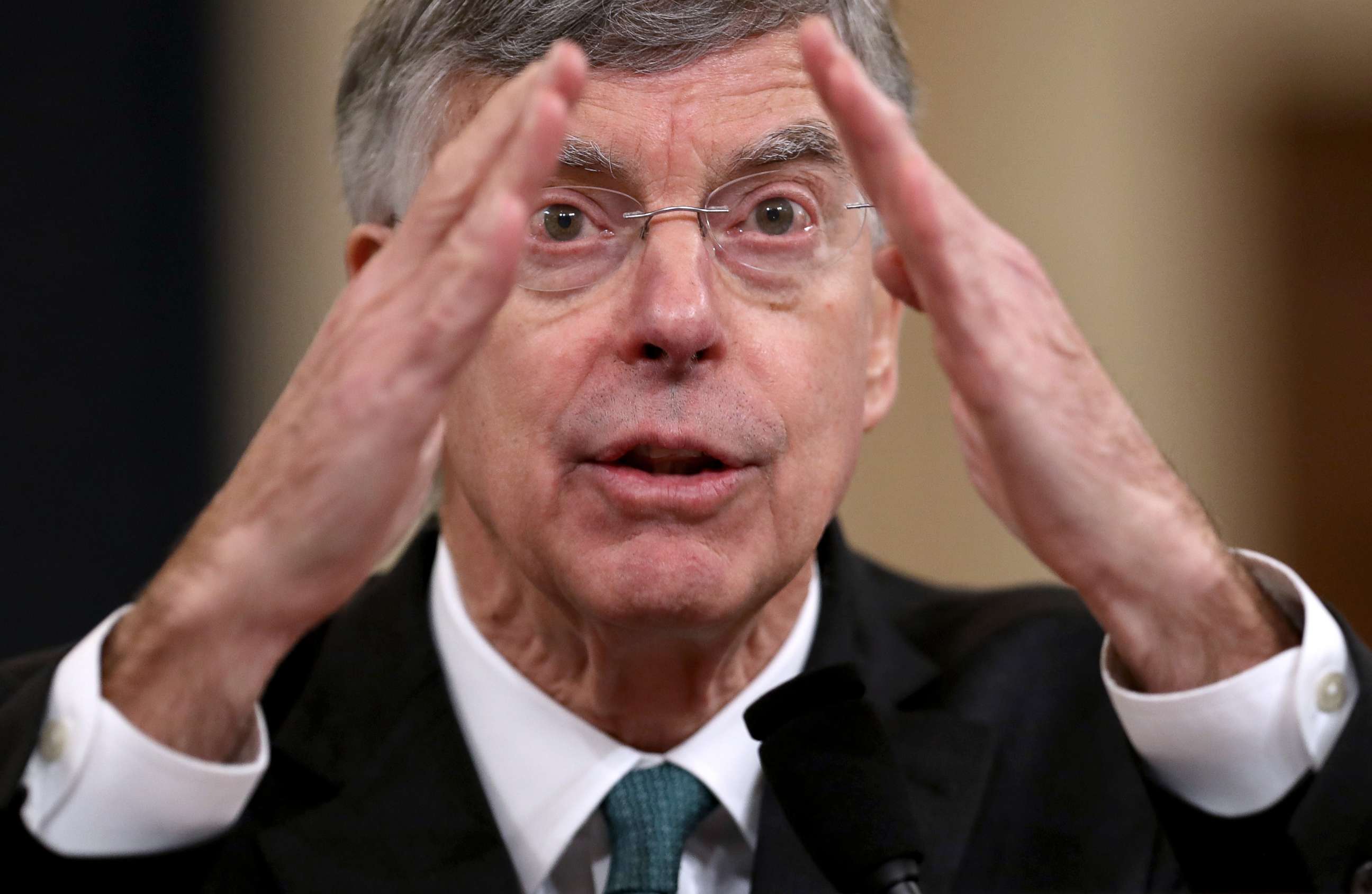
- Taylor previously served as the U.S. ambassador to Ukraine from 2006 and 2009 after working in the Middle East and Afghanistan. A West Point graduate who served in Vietnam and Germany, Taylor was most recently working as the executive vice president of the U.S. Institute of Peace, before rejoining the State Department.
- The top U.S. diplomat for Ukraine told Congress in closed-door testimony that "it was becoming clear" to him that a meeting between Trump and the Ukrainian President "was contingent upon the investigation of Burisma and alleged Ukrainian interference in the 2016 elections,” according to his opening statement.
- Regarding the transcript released by the White House of the July 25 phone call between Trump and the Ukraine president, he said, "Although this was the first time I had seen the details of President Trump's July 25 call with President Zelenskyy, in which he mentioned Vice President Biden, I had come to understand well before then that ‘investigations' was a term that Ambassadors Volker and Sondland used to mean matters related to the 2016 elections, and to investigations of Burisma and the Bidens."
- During his public hearing, Taylor revealed details about an alleged phone call on July 26 between Sondland and Trump. According to Taylor, one of his staffers -- David Holmes -- was in a restaurant in Kyiv with Sondland following a meeting with Zelenskiy when he overheard Trump ask Sondland the status of "the investigations." "Ambassador Sondland told President Trump that the Ukrainians were ready to move forward," Taylor said.
- Taylor testified that he believed the “irregular” diplomatic channel employed by Giuliani was used to benefit Trump.
- He would not say that Trump’s alleged actions constitute an impeachable offense: “That is your job,” he told lawmakers.
- Read the transcript.
- Read his public hearing opening statement.
Oct. 23 (closed-door) and Nov. 20 (public), 2019: Laura Cooper, deputy assistant secretary of defense for Russia, Ukraine, Eurasia
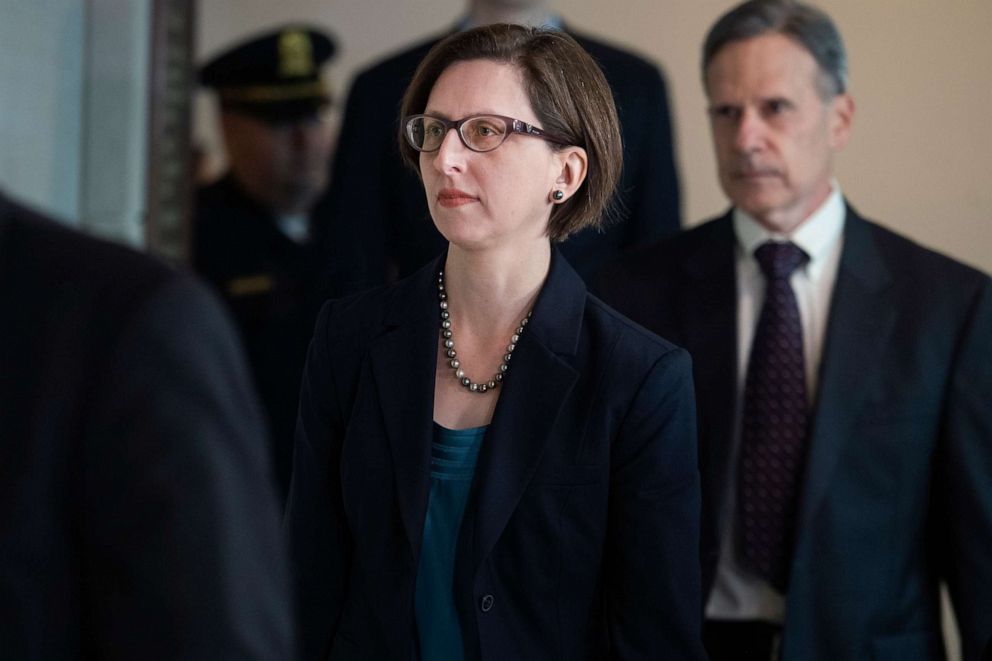
- Cooper joined the Department of Defense in 2001, after working in counterterrorism at the State Department.
- Behind closed doors, she fielded questions surrounding the Trump administration’s withholding of nearly $400 million in military assistance to Ukraine.
- According to her deposition transcript, Cooper said that aides were confused by the hold on the financial aid because the Defense Department had certified the financial transfer last May when Ukraine had met the necessary anti-corruption benchmarks.
- Cooper’s deposition was delayed by 5 hours when House Republicans stormed the secured hearing room where her deposition was taking place.
- In her public hearing, Cooper testified that her staff told her they were contacted by Ukrainian embassy officials about the status of the Ukraine aid the same day as Trump’s July 25 phone call, calling into question the GOP argument that there couldn’t have been a quid pro quo because Kyiv wasn’t aware that military aid was on hold at the time.
- "I would say specifically the Ukrainian embassy staff asked, 'what is going on with Ukrainian security assistance?'" Cooper testified.
- Read the transcript.
- Read her public hearing opening statement.
Oct. 26, 2019: Philip Reeker, acting assistant secretary of European and Eurasian affairs
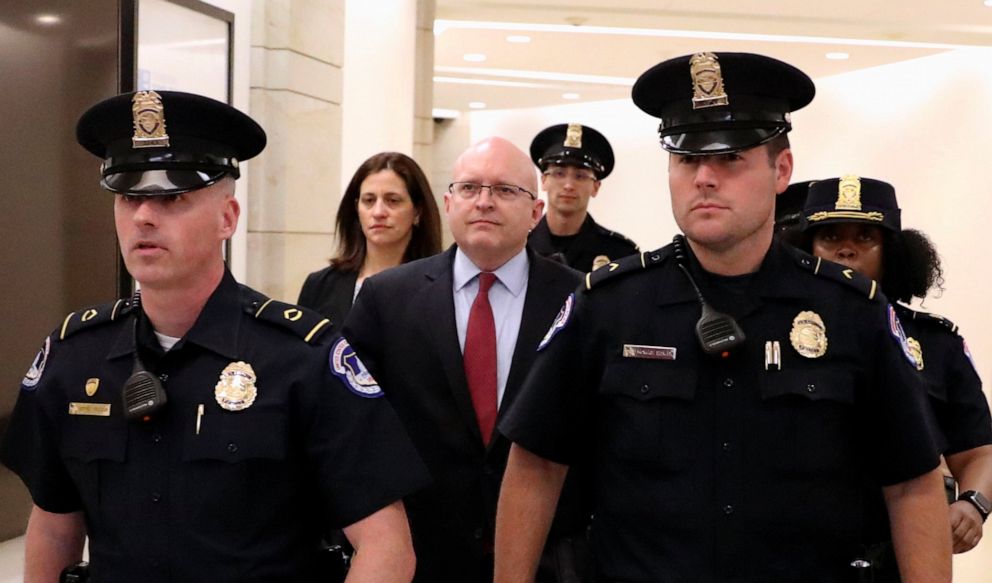
- Reeker has been a Foreign Service officer since 1992 under Republican and Democratic administrations. He received the nomination for and became ambassador to Macedonia under President George W. Bush and previously served as deputy assistant secretary for Europe and deputy spokesperson for the department.
- Reeker, who appeared under subpoena, said he thought there was no credence to the attacks on Yovanovitch, a source with direct knowledge of his testimony told ABC News.
- According to emails turned over by the State Department to its inspector general and obtained by ABC News, Reeker forwarded emails in March to Ulrich Brechbuhl, a top adviser for Pompeo, about attacks against Yovanovitch while she was still ambassador.
- In an email to Brechbuhl, Reeker called the accusations against Yovanovitch a "fake narrative" that was "really ... without merit or validation."
Oct. 29 (closed-door) and Nov. 19 (public), 2019: Army Lt. Col. Alexander Vindman, director of European affairs for the National Security Council
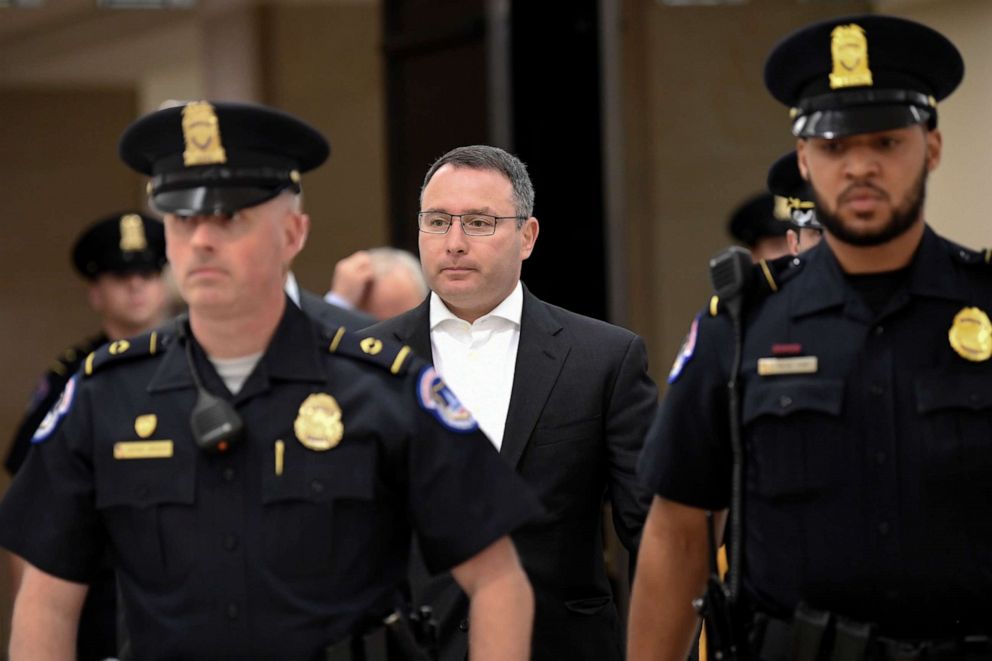
- Vindman fled the former Soviet Union to the U.S. as a child. He rose through the ranks in the Army, earning a Purple Heart along the way after being wounded in an IED explosion in Iraq.
- The first current White House official to testify, Vindman, in his opening remarks, said he “did not think it was proper to demand that a foreign government investigate a U.S. citizen” and that he “was worried about the implications for the U.S. government’s support of Ukraine.”
- Following Trump’s July 25 Ukraine call, Vindman -- who was listening to the call -- said he had “no doubt” that Trump was pressuring Ukraine to investigate his political rival, according to the transcript. He also said he reported his concerns to the National Security Council’s top lawyer because he was so “concerned.”
- He said he reported concerns to White House legal counsel about Sondland’s comments to a top Ukrainian official two weeks before Trump’s phone call, in which Sondland "started to speak about Ukraine delivering specific investigations in order to secure the meeting with the President, at which time Ambassador Bolton cut the meeting short,” according to the transcript.
- Vindman, wearing his Army dress uniform for his public hearing, solicited applause from the room when he said he assured his "deeply worried" father that he could speak out because "this is America … and here, right matters."
- Vindman testified that he shared the details of Trump's July 25 phone call with two people outside the National Security Council who had an "appropriate need to know" – Kent and a member of the intelligence community. The whistleblower has been identified as an intelligence official, and the complaint he or she filed in August ultimately kicked off the impeachment inquiry.
- Read the transcript.
Oct. 30, 2019: Christopher Anderson, former special adviser to Kurt Volker
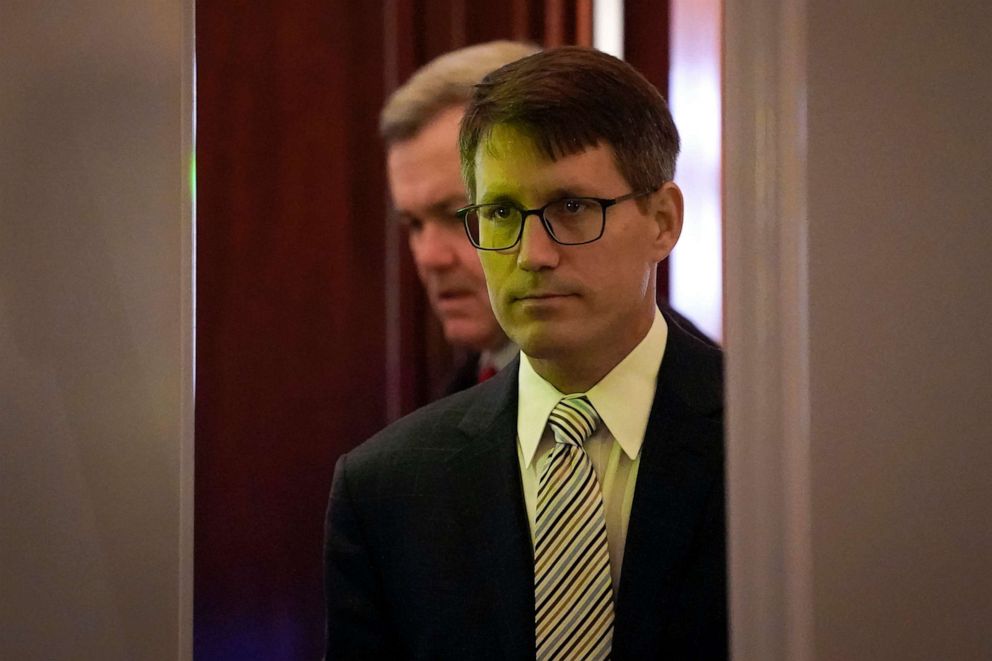
- According to his testimony, Anderson first joined the Foreign Service in 2005. He was posted in the Kyiv embassy from 2014 until 2017, when Volker asked him to serve as his Ukraine adviser.
- Recalled being in a meeting with then-national security adviser John Bolton in which Bolton "cautioned that Mr. Giuliani was a key voice with the President on Ukraine which could be an obstacle to increased White House engagement," according to his prepared remarks.
- Read the transcript.
Oct. 30, 2019: Catherine Croft, State Department Ukraine specialist
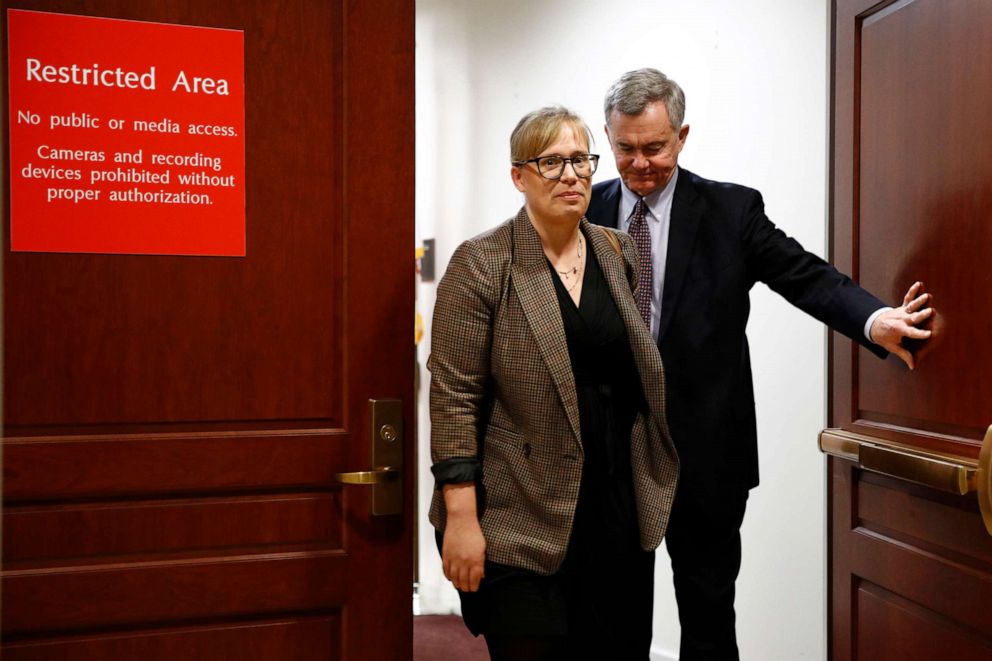
- A career diplomat, Croft oversaw Ukraine policy at the National Security Council from July 2017 to July 2018 before being tapped to advise Volker. According to her testimony, Croft was a Foreign Service officer for the last 9 years.
- She appeared under subpoena and testified that during a meeting in July, “an [Office of Management and Budget] representative reported that the White House Chief of Staff, Mick Mulvaney, had placed an informal hold on security assistance to Ukraine,” according to a prepared statement. This was done at the president’s direction, according to the statement.
- Croft, in her deposition, said she expressed her concerns to a colleague earlier this year that if Trump saw Biden as a "credible rival," he might try to change U.S. policy on Ukraine: "It was possible that the Trump administration would choose to change its policy to suit domestic politics," she testified.
- Read the transcript.
Oct. 31, 2019: Tim Morrison, National Security Council senior director for Europe and Russia
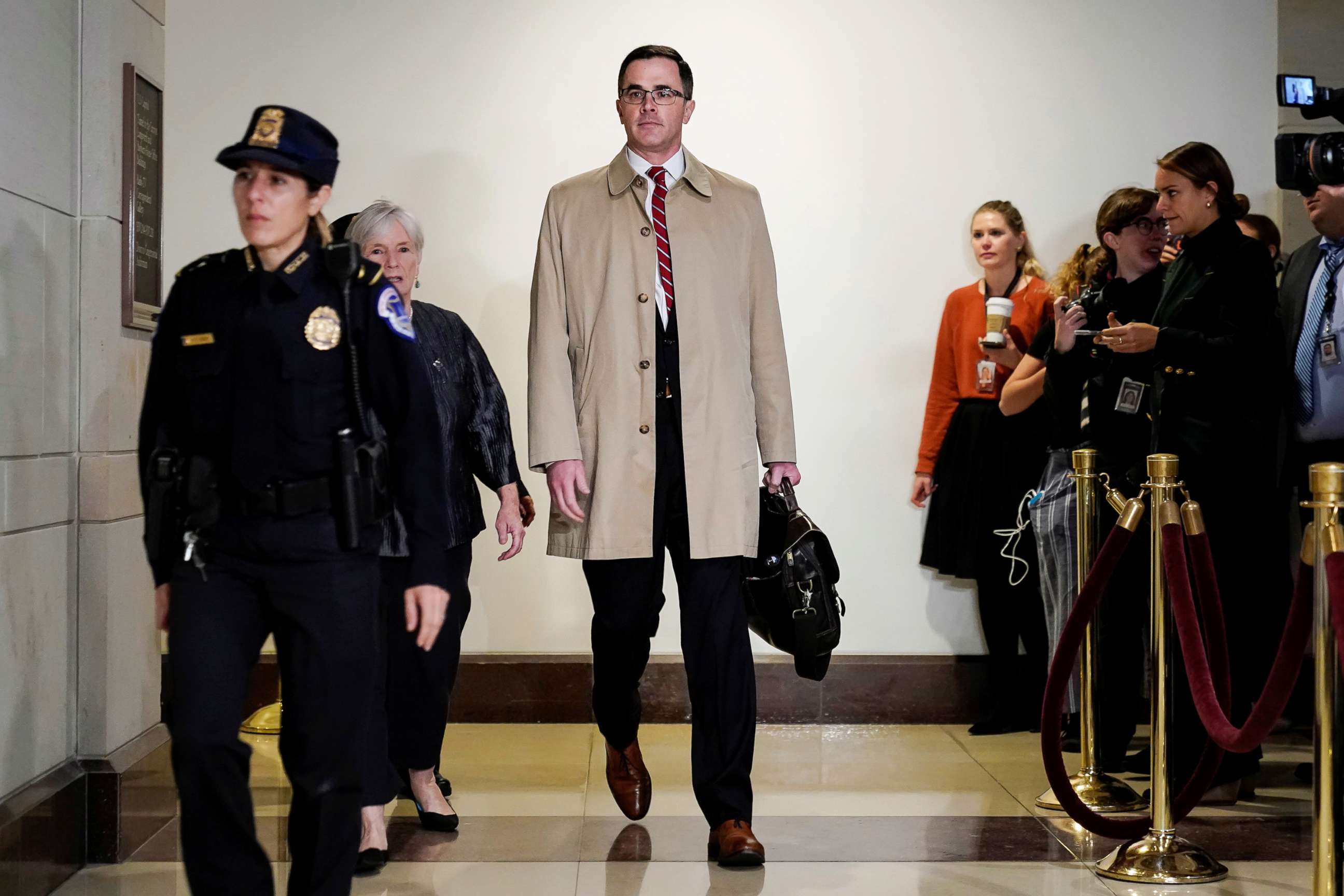
- Morrison joined the National Security Council in 2018, after working for 17 years as a Republican staffer, according to his opening statement.
- Morrison corroborated elements of earlier testimony from Taylor about the efforts to pressure Ukraine to open political investigations in exchange for military aid and a White House meeting between President Donald Trump and Zelenskiy.
- "Ambassador Taylor and I had no reason to believe that the release of the security sector assistance might be conditioned on a public statement reopening the Burisma investigation until my ... conversation with Ambassador Sondland," Morrison told investigators, according to a copy of his opening remarks obtained by ABC News.
- Morrison said the rough transcript of the Trump-Zelenskiy call "accurately and completely reflects the substance of the call," and that he was "not concerned that anything illegal was discussed."
- During his public hearing, Morrison said he asked the White House legal counsel’s office to restrict access to details about Trump’s July 25 phone call because he was so concerned with the “potential political fallout” if those details leaked.
- Read the transcript.
Nov. 6 (closed-door) and Nov. 20 (public), 2019: David Hale, undersecretary of state for political affairs
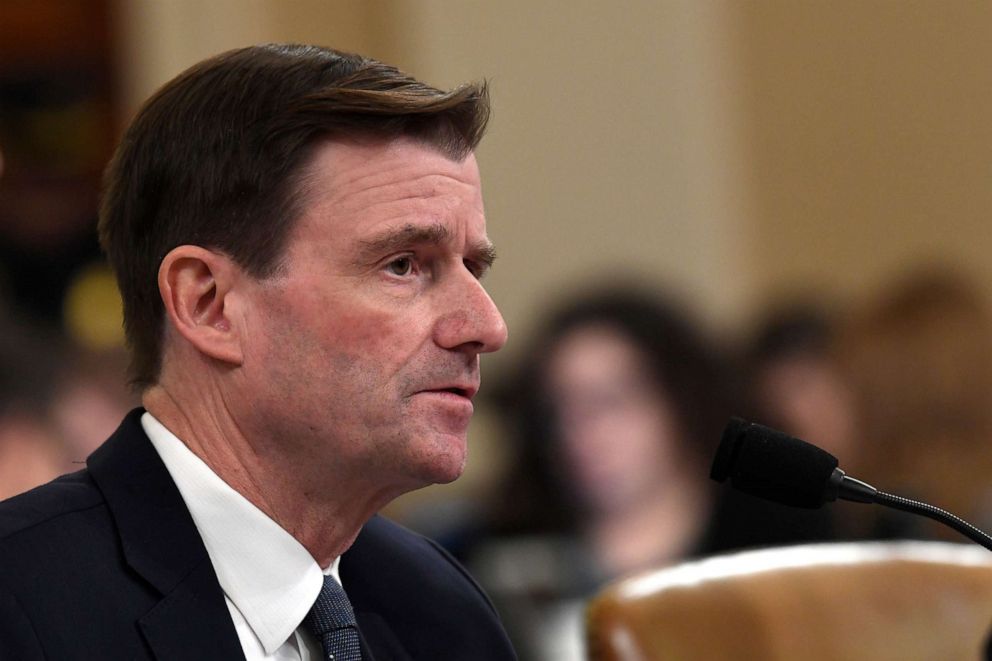
- Hale is a career Foreign Service officer who first joined the State Department in 1984. His previous roles include serving as ambassador to Pakistan, Lebanon and Jordan, and as special envoy for Middle East peace.
- In his closed-door deposition, Hale testified that Pompeo was in a position to protect Yovanovitch from what he described as a “smear campaign” and that he urged Pompeo to issue a full statement that would have denied allegations against her. That statement never came.
- “The implication was that this was a roundabout way the president was trying to get rid of the ambassador through this smear campaign,” Hale said, according to his deposition transcript.
- Regarding the held-up aid to Ukraine, Hale, during his public hearing alongside Cooper, testified that an OMB representative said at a July interagency meeting that "they were objecting to proceeding with the assistance, because the president had so directed through the acting chief of staff," referring to acting White House chief of staff Mick Mulvaney, who had previously led OMB.
- Read the transcript.
Nov. 7 (closed-door) and Nov. 19 (public), 2019: Jennifer Williams, special adviser to Vice President Mike Pence for Europe and Russia
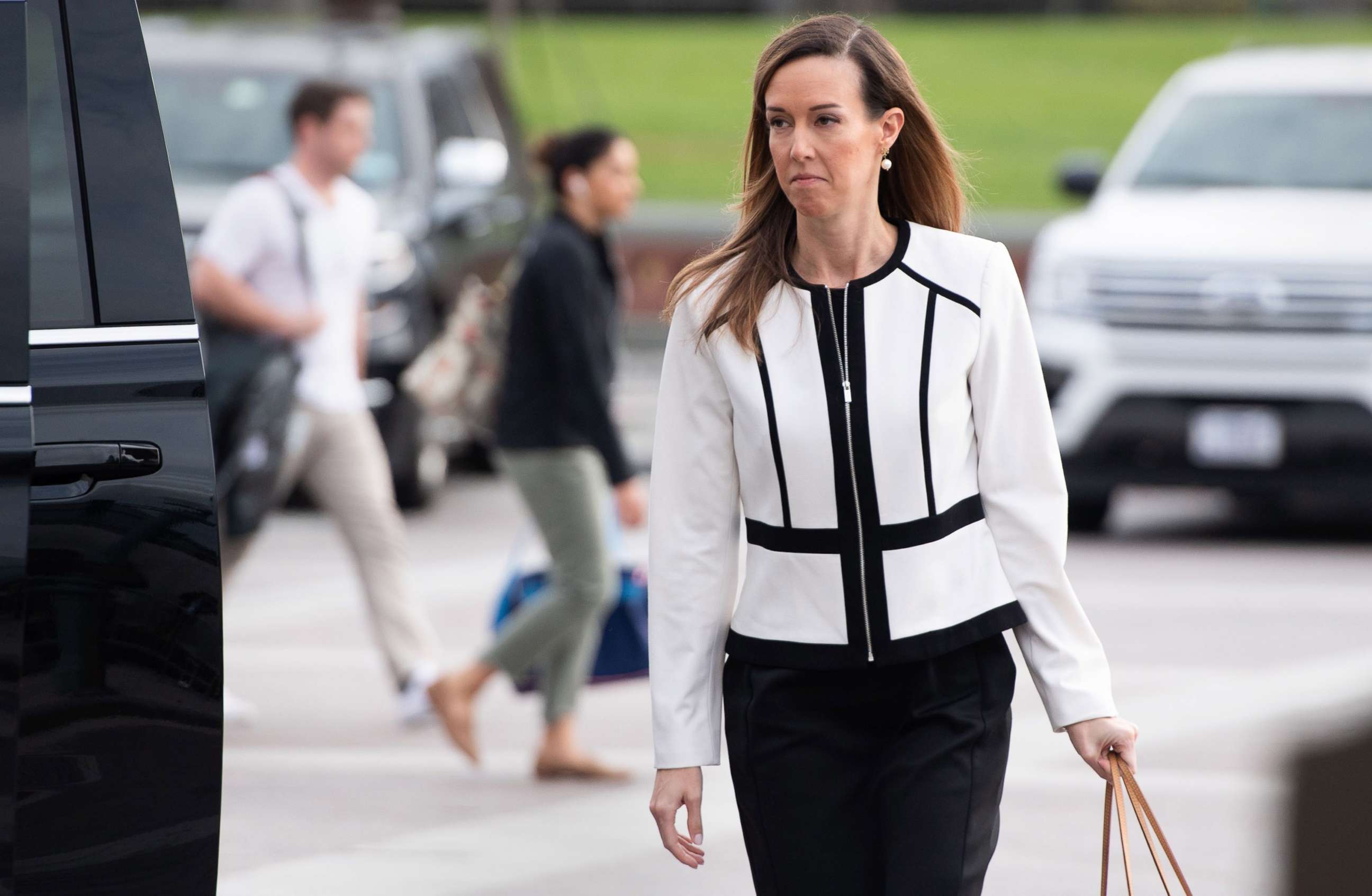
- A Foreign Service officer for over a decade, Williams’s previous postings include Jamaica, Lebanon, the United Kingdom and Washington, D.C. She worked at the Department of Homeland Security before joining the State Department.
- Pence's office said Williams does not directly work for the vice president but is on detail from the State Department and reports to Gen. Keith Kellogg, Pence's national security adviser. Williams said she never discussed the nature of the call with Kellogg.
- Williams was on the July 25 call between Trump and Zelenskiy.
- She appeared before impeachment investigators under subpoena. In her deposition transcript, Williams said she found Trump’s reference to investigations into the Bidens and the 2016 election “unusual and inappropriate.”
- "I guess for me, it shed some light on possible other motivations behind a security assistance hold," Williams said.
- Williams testified that she never witnessed Pence mentioning an investigation, the Bidens or Burisma during his meetings with Zelenskiy.
- Trump tweeted about Williams during her public hearing, calling her a “never Trumper” who he “mostly never even heard of.” Williams said the tweet surprised her and that she did not identify as a “never Trumper.”
- Trump’s tweet prompted Democrats to accuse him of witness intimidation.
- Read the transcript.
Nov. 15 (closed-door) and Nov. 21 (public), 2019: David Holmes, political counselor at U.S. embassy in Ukraine
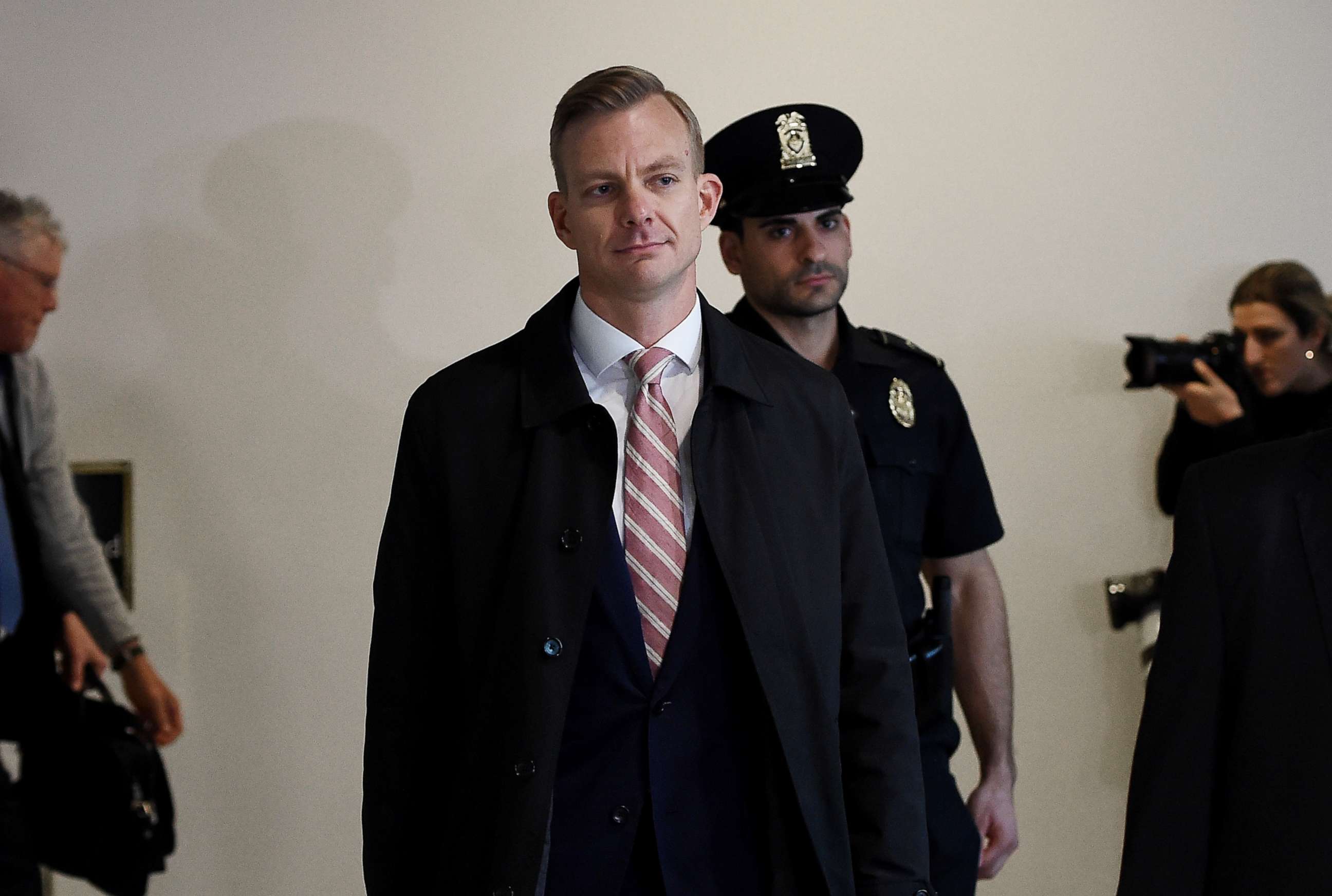
- Holmes is a career Foreign Service officer whose previous assignments include stints in India, Afghanistan, Colombia and Kosovo, according to his opening statement. He also has served on the National Security Council.
- Appearing behind closed doors under subpoena, Holmes described the phone conversation he said he overheard between Trump and Gordon Sondland about "the investigations."
- "I then heard President Trump ask, 'So he's gonna do the investigation?' Ambassador Sondland replied that 'he's gonna do it,'" and that Zelenskiy "will do 'anything you ask him to,'" Holmes said in his opening statement. He added that Trump’s voice was so loud that Sondland had to hold the phone away from his ear.
- Later in his statement, Holmes said, "I noted there was 'big stuff' going on in Ukraine, like a war with Russia, and Ambassador Sondland replied that he meant 'big stuff' that benefits the President, like the 'Biden investigation' that Mr. Giuliani was pushing."
- In his public hearing, Holmes also detailed Energy Secretary Rick Perry’s involvement in Ukraine, including that his staff "excluded" embassy personnel from listening in on meetings with Ukrainian officials and that Perry passed to Zelenskiy a list of “people he trusts” to help the country with energy reform.
- Read his opening statement.
Nov. 16, 2019: Mark Sandy, deputy associate director for national security programs at Office of Management and Budget
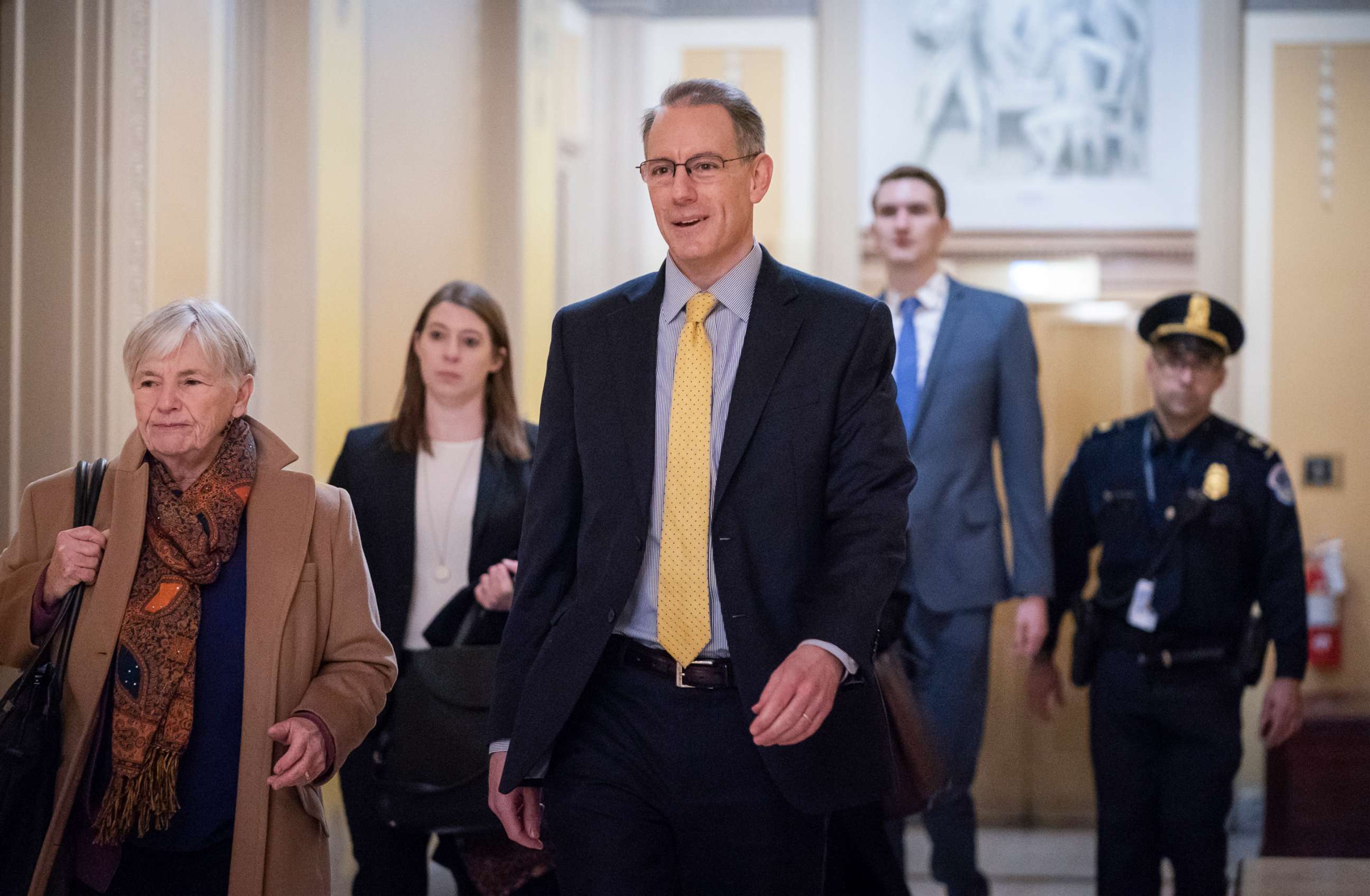
- Sandy testified behind closed doors under subpoena -- against White House orders -- making him the first OMB official to appear for questioning in the House impeachment inquiry.
- He signed the initial paperwork withholding foreign aid to Ukraine.
- Throughout the inquiry, the OMB has spurned repeated demands and subpoenas from House Democrats seeking documents and records relevant to their probe.
- Details of his testimony were not immediately available.
ABC News' Benjamin Siegel, John Santucci, Katherine Faulders, Matthew Mosk, Ali Dukakis, Allison Pecorin, Laura Romero, Lucien Bruggeman, Soo Rin Kim, Justin Fishel, Megan Hughes, Jordyn Phelps, Shannon Crawford, Kathryn McQuade, Connor Finnegan and Cindy Smith contributed to this report.




